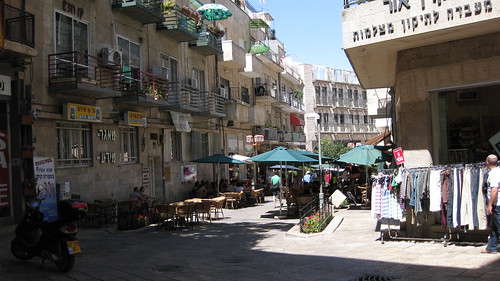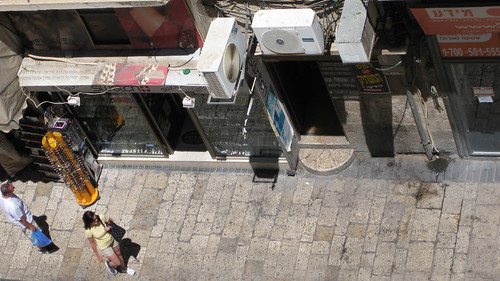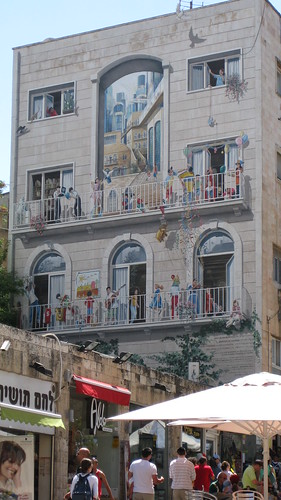I mentioned back on July 23 that part of my job had become factory work. This part of the job has continued to this day, and has become a pretty full part of my job due to the back-to-school and tourist season. This is also a big part of the reason that this blog has not received daily updates as I'd originally planned. (But I'm collecting material in the meantime, boy am I ever.)
As I build up some expertise in the production of the school supplies that we make, I've come to enjoy the process and the workshop environment more and more. I love working with my hands. I'm just waiting for someone to ask me, "Is that what your six years of grad school were for?" so I can answer a resounding: "Yes! That, and any other job I have the fortune of getting experience from!"
My boss, the company's founder and owner, mentioned today that I had developed a particular style in the task of finishing backpacks. He compared it to what a good bartender does. It makes sense: I've probably made a thousand or two backpacks by now, and the routine is getting pretty streamlined.
It may be a video to put on the company website, he said.
Before that happens, I think I'd better improve the routine even more. It will be a while. You read it here first.
Wednesday, August 26, 2009
Tuesday, August 11, 2009
Working in the midereḥov
 I work in a retail store in the downtown pedestrian mall (the "midereḥov") of Jerusalem. That's the other side of the day job I'm not quitting. This is the second time I've worked in a store in the midereḥov since moving to Israel 6 years ago, so I am fairly familiar with the scene.
I work in a retail store in the downtown pedestrian mall (the "midereḥov") of Jerusalem. That's the other side of the day job I'm not quitting. This is the second time I've worked in a store in the midereḥov since moving to Israel 6 years ago, so I am fairly familiar with the scene.If you don't know what that is: well, first of all, it's not a mall. It's a couple of wide, stone-paved streets that are mostly blocked off to traffic and lined on both sides with storefronts, banks, and entrances to the apartments and offices that rise above the commercial landscape. There are islands in the middle of the street that provide a little greenery and a little seating here and there. It's a popular site for street festivals or throngs of Saturday night shoppers who prefer the outdoors to a "real" mall, grabbing the last few moments of the weekend before Sunday morning and the business week sets in. That's where the photos in this entry came from, plus these here.
I am guessing that the traffic is about half tourists, half Israelis. More tourists in the summer, of course. This means that I get to deal with a variety of nationalities and a variety of mentalities on a daily basis. There are also street performers all the time, and since I work near a major intersection I get to hear their entire repertoire, repeatedly. There is nearly never a dull moment.
Different people have different impressions of Ben Yehudah. I think for a lot of foreigners, even those who live here long-term, this is like the most glamourous spot in the city, a romantic hub of excitement and energy.

I don't experience the midereḥov like that. For me it has always been about business and efficiency, making every moment count because the clock is ticking. This is not unpleasant, but it puts me in a frame of mind that few of the street passengers I see are sharing.
I have no background in commerce and no formal business education, but "on the street" experience in the last decade has changed that. I used to be an academic, spent as much time on campus as possible, and never learned the rules of the "shuk", as it's called here, until I was in the middle of it.
Besides being a salesman in a store and dealing with a variety of customers, I've also managed a virtual office, that me and my fellow project employees built from scratch. It started out as an Israeli team, and eventually spanned four continents. This was completely different from the experience I'm getting now in manufacturing and retail, and it is great to see a variety of businesses, from all different angles.

And I have a dilemma. Especially given the elephantine memory of the internet, I don't know how much detail to go into regarding my personal interaction with customers and other people off the street.
I really want to. I want to tell you about the customer who verbally abused me for 15 minutes this morning, including banging on the glass to insist that she get her way. And I want to tell you how one particular nationality of people (a nation that I used to want to be a citizen of, obsessively trying to make myself one of them) is collectively driving me crazy, to the point that I dread hearing their accent when they walk in the store.
What do you think?

Changing the subject (ahem), this building has been decorated by an art form called "Trompe-l'œil" (optical illusion) that is particular to Lyon, France. Apparently the same artists were hired for these Jerusalem buildings, too. There are a few of them around town here, and I will try to get some good shots of them another time. But for now, the best I have to offer is the higher-resolution image you can see by opening this link.
Monday, August 10, 2009
The Command Line Podcast unbook
Last week I decided to help out The Command Line Podcast by volunteering some transcription work. Thomas Gideon, a.k.a. cmdln, has collected some recordings of his "Inner Chapters" segments from his podcast, on the practice and art of computer programming, and has compiled a podiobook from them. He then asked listeners to help out with the effort of transcribing those chapters in order to make an unbook out of them.
If that whole paragraph didn't make sense to you, don't feel bad. I tried to explain it this morning to someone who does not listen to podcasts, is not interested in programming, has never heard of a podiobook, and certainly does not know what an unbook is. That was tough. But if you want to know more, follow the links.
I discovered The Command Line Podcast after he featured some of the chapters of Cory Doctorow's work "Content", and have listened to him ever since. Although my experience and knowledge of the profession is far inferior to his, my extremely amateur dabbling in hacking dates back far enough (about 20 years) that I can understand on a lot of the material on an intuitive level, even if I don't understand all of the details.
As a professional transcriber, or I guess I should say a "former" professional transcriber since my work with NPR has come to an end and I have moved on to greener pastures, I decided to pitch in with this project, keeping my skills fresh and learning a lot about the subject at the same time. (I love this kind of cooperative model because it means everybody wins.)
In yesterday's podcast he mentioned me by name (well, the handle I use), so I thought it was worth mentioning here. Furthermore, if anything I have said in this entry was not only comprehensible to you but also interesting, feel free to join in on the TCLP unbook transcription project, or at least see his blog and listen to the show.
If that whole paragraph didn't make sense to you, don't feel bad. I tried to explain it this morning to someone who does not listen to podcasts, is not interested in programming, has never heard of a podiobook, and certainly does not know what an unbook is. That was tough. But if you want to know more, follow the links.
I discovered The Command Line Podcast after he featured some of the chapters of Cory Doctorow's work "Content", and have listened to him ever since. Although my experience and knowledge of the profession is far inferior to his, my extremely amateur dabbling in hacking dates back far enough (about 20 years) that I can understand on a lot of the material on an intuitive level, even if I don't understand all of the details.
As a professional transcriber, or I guess I should say a "former" professional transcriber since my work with NPR has come to an end and I have moved on to greener pastures, I decided to pitch in with this project, keeping my skills fresh and learning a lot about the subject at the same time. (I love this kind of cooperative model because it means everybody wins.)
In yesterday's podcast he mentioned me by name (well, the handle I use), so I thought it was worth mentioning here. Furthermore, if anything I have said in this entry was not only comprehensible to you but also interesting, feel free to join in on the TCLP unbook transcription project, or at least see his blog and listen to the show.
Friday, August 7, 2009
How to break a fast

How do you break a fast? While it's not exactly topical now, a week after the Biggee, our other 25-hour fast is coming up in just over a month.
After such a stretch with no food or liquids, the obvious answer would seem to be: cram it in, everything you can get your hands on!
My friend Yishai taught me long ago to start with a pastry and coffee, and ease into a full meal. Although his choice of pastry is cake, mine is baklawa.
I also make sure to rehydrate with water so the brain will start working ― advice that I first read from champion bicyclist Andy Hampsten sometime around 1991, not about a period of unusual deprivation, but about the fast-breaking involved in waking up each morning. I have followed this advice ever since and have had great health.
Although this advice was given in the context of professional sports, it was confirmed by the guys who made the behind-the-scenes documentary about surviving on a desert island titled S.T.O.P.: Surviving as a Castaway. I'm quoting from memory, but they said that as long as you don't drink water, you get dumber and dumber, slower and slower.
I have experienced this, while not trying to survive on a desert island, as the inability to choose what will be the first thing I am going to eat or drink. Even out on the street on a normal day, if I don't keep hydrated, I get irrational.
I would also recommend a variety of foods to replenish needed nutrients after a fast, although this is just common sense to me, not trained medical advice. This also takes some planning, since the starving brain will probably not want to stop eating something, once it gets started.
I have relatives who immediately sit down to a full Persian meal fit to feed the masses. And while this takes into account the need for nutrition, I believe it's not the ideal plan of attack. It's too easy in a heavy meal not to drink enough fluids, and therein lies madness.
To be fair, it is traditional for Persians to start the break-the-fast with a traditional dish made of grated apples, honey (optional), and rose water (to taste). I can't give any quantities here, and don't even know what it is called, but the consistency is more like a soup than a drink.
Another Persian opinion that I got, when I asked this question to my friends, is to "start of with some chai; then have some watermelon; then dig into whatever your heart desires." (Chai is the Farsi word for tea, although both the words "chai" and "tea" have Chinese origins; it just depends on which culture took the word from which region of China).
I'm not a physician, nor do I play one on T.V. If you have more medically sound advice, please share it.
(Image: toastforbrekkie, "Baklawa and Arabic coffee", licensed under Creative Commons. Thanks, "Toast For Brekkie"!)
Sunday, August 2, 2009
Avot uBanim for the first time
I went to Avot uBanim in my synagogue (i.e. closest-thing-to-a-home-synagogue) yesterday. For those who don't know what that is, it's an hour of father-son study time that is organised to happen once a week. I went with my 3-year-old son, and this was our first time.
 I went, despite being fully aware of this article by Rabbi Francis Nataf of the Cardozo Academy. When that article was first published I truly agreed with it. It resonated with me, partly because I don't like being told what to do. Especially without being convinced that it's the right thing to do, for reasons that I appreciate as good and true reasons. I'm stubborn that way.
I went, despite being fully aware of this article by Rabbi Francis Nataf of the Cardozo Academy. When that article was first published I truly agreed with it. It resonated with me, partly because I don't like being told what to do. Especially without being convinced that it's the right thing to do, for reasons that I appreciate as good and true reasons. I'm stubborn that way.
I would add to the reasons that would seem to be against going to Avot uBanim: the real age that boys are expected to start going with their fathers is age 5; there's no Avot uBanot for fathers and daughters to study together, which is clearly rotten; I'm afraid of the bad influence that my son will get from the rowdy synagogue boys who obviously aren't growing up with the kind of discipline that I grew up with. You know, Israelis.
So why did I go yesterday? A few reasons.
The younger, idealistic side of me is looking at my 2009 counterpart and accusing me of caving in.
Still, looking again at Rabbi Nataf's article, I can't say that he is wrong. I can't say that I'm wrong for doing this, either.
Rabbi Nataf's principle objection seems to be that our society is imbalanced if it needs to set up a special programme to help us fulfil a certain, basic obligation. To which I respond: guilty as charged.
And now that I've been deep in this society for six-plus years, my opinion is that this society is so phenomenally clueless about many aspects of just about every specific mitsvah, that yeah, a special programme for each one of them would not be out of order. The "obligation" of Avot uBanim looks just as rational to me now as does the "obligation" of special congresses on Shabbat observance and all kinds of wonderful other mitsvot that are streamlined, minimised, or downright neglected.
To end on a good note, though, I discovered a new practical benefit of Avot uBanim: to teach him things they are likely not to teach him in school. Assuming I'll have all my ducks in a row and will be giving him the proper father-son time on a regular basis (as well as the father-daughter time that I equally owe), maybe this is how he'll begin to learn to read English, too. Maybe I can spark an interest with him for history, geography, astronomy, and art. As he gets older: algebra, and how to read the codes on the side of a transistor or a schematic diagram. Maybe the after-Shabbat Avot uBanim hours (in the winter, when the days are shorter) is where we'll build our first crystal radio set together (or at least, learn the theory behind it). These ideas come from just a moment's worth of brainstorming, and as I rub my hands together in anticipation, a smile is on my face.
I don't like being told what to do.
 I went, despite being fully aware of this article by Rabbi Francis Nataf of the Cardozo Academy. When that article was first published I truly agreed with it. It resonated with me, partly because I don't like being told what to do. Especially without being convinced that it's the right thing to do, for reasons that I appreciate as good and true reasons. I'm stubborn that way.
I went, despite being fully aware of this article by Rabbi Francis Nataf of the Cardozo Academy. When that article was first published I truly agreed with it. It resonated with me, partly because I don't like being told what to do. Especially without being convinced that it's the right thing to do, for reasons that I appreciate as good and true reasons. I'm stubborn that way.I would add to the reasons that would seem to be against going to Avot uBanim: the real age that boys are expected to start going with their fathers is age 5; there's no Avot uBanot for fathers and daughters to study together, which is clearly rotten; I'm afraid of the bad influence that my son will get from the rowdy synagogue boys who obviously aren't growing up with the kind of discipline that I grew up with. You know, Israelis.
So why did I go yesterday? A few reasons.
- Believe it or not, there's actually a language barrier between me and my son. I mostly speak English and he speaks Hebrew. I want to make it normal for us to sit and study something together one-on-one before he gets old enough to think there's a problem.
- He can already learn the aleph-beth, and and his gan (preschool) is not taking care of that. That's what we spent the hour doing (using the slightly weird book illustrated above).
- Finally, and perhaps the cinching argument: whatever school he goes to is going to require weekly attendance at Avot uBanim as part of his homework, and he will be made to feel extremely left out among his peers if he doesn't attend, when the time comes.
The younger, idealistic side of me is looking at my 2009 counterpart and accusing me of caving in.
Still, looking again at Rabbi Nataf's article, I can't say that he is wrong. I can't say that I'm wrong for doing this, either.
Rabbi Nataf's principle objection seems to be that our society is imbalanced if it needs to set up a special programme to help us fulfil a certain, basic obligation. To which I respond: guilty as charged.
In the Orthodox community, having a movement for parents to learn Torah with their children is like having a movement for the observance of Shabbat. Could we imagine organizations that would provide incentives and creative avenues to encourage observing Shabbat among the Orthodox? The existence of such incentives would symbolize nothing less than a lack of intrinsic motivation to keep that particular mitzvah. If such a scenario seems completely unthinkable, we need to ask ourselves why the need for the promotion of intergenerational study is not equally ludicrous.
And now that I've been deep in this society for six-plus years, my opinion is that this society is so phenomenally clueless about many aspects of just about every specific mitsvah, that yeah, a special programme for each one of them would not be out of order. The "obligation" of Avot uBanim looks just as rational to me now as does the "obligation" of special congresses on Shabbat observance and all kinds of wonderful other mitsvot that are streamlined, minimised, or downright neglected.
To end on a good note, though, I discovered a new practical benefit of Avot uBanim: to teach him things they are likely not to teach him in school. Assuming I'll have all my ducks in a row and will be giving him the proper father-son time on a regular basis (as well as the father-daughter time that I equally owe), maybe this is how he'll begin to learn to read English, too. Maybe I can spark an interest with him for history, geography, astronomy, and art. As he gets older: algebra, and how to read the codes on the side of a transistor or a schematic diagram. Maybe the after-Shabbat Avot uBanim hours (in the winter, when the days are shorter) is where we'll build our first crystal radio set together (or at least, learn the theory behind it). These ideas come from just a moment's worth of brainstorming, and as I rub my hands together in anticipation, a smile is on my face.
I don't like being told what to do.
Subscribe to:
Posts (Atom)




